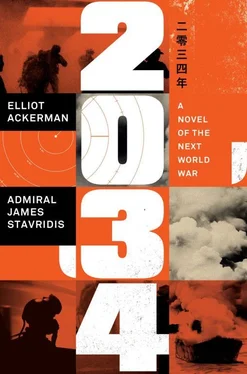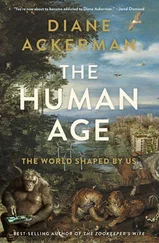The decor hadn’t changed in the intervening years, the plump goldfish in the gurgling aquarium, the reproductions of dynastic woodblock prints on the walls. “Nice choice, Sammy,” Chowdhury said flatly.
“You used to like this place,” she replied, and then added, “Please don’t call me that.”
When they’d been at graduate school together, her friends had called her Sammy and her professors had called her Samantha, but the further those years receded, the more she insisted on the formal name.
Chowdhury apologized—“Samantha”—and explained that given the current geopolitical crisis and his role in it, her choice of a Chinese restaurant seemed to be, “How shall I put this,” he said, “a passive-aggressive move.”
“You’re the one who asked me to meet you, Sandeep,” she replied, nearly spitting out his name. “Now more than ever, supporting businesses like this one is the right thing.” God, she was insufferable, thought Chowdhury, always so quick to tell you what was or was not the right thing . “Ten million people are dead in Zhanjiang. Why don’t you order the Peking duck, asshole. It’s the least you could do.”
She flagged down their waiter.
Chowdhury cupped his hand over his mouth to conceal a smile. Samantha’s attitude and her sense of humor—the two were often one and the same. What he appreciated in her and what repelled him about her had always coexisted, so perhaps their relationship had been doomed from the start. However, this didn’t prevent him from admiring Samantha for the seconds it took her to gain their waiter’s attention and order an entire Peking duck. “What do you want?” she asked him.
“Just a wonton soup,” Chowdhury answered as he handed the waiter his menu.
The waiter receded toward the kitchen.
“Are you kidding me?” said Samantha. “That’s all you’re going to—”
Chowdhury cut her off, “Just stop.” He could feel his blood rising. “What organization have you got paying you minimum wage while I subsidize your do-gooding with alimony payments? What’s it today? Human Rights Watch? Amnesty International? PETA?” She pushed away the table so she could climb from the booth and leave. It stuttered across the floor and jammed Chowdhury in the ribs, which was enough to bring him back to his senses. “Wait,” he said sharply between his teeth. “Please,” and he made a motion with his hands. “Sit down.”
She glanced once at him.
“Please,” he repeated, knowing that what he was about to tell her would likely cause her to get up all over again. She sat down, took a breath, and crossed her arms over her chest. “Thank you,” he said.
“Why did you need to see me?” she asked. For the first time, Chowdhury wondered about the reasons she had imagined for their meeting: that he’d lost his job; that his mother was sick; that he was sick. Whatever it was, she was carrying the expectation in her rigid posture and the slight frown she wore.
He blurted out what he’d done with their daughter in a single long sentence: “I won’t be dropping off Ashni to you on Thursday because she’s with my mother in New Delhi staying with my uncle the vice admiral since it isn’t safe here after what we did at Zhanjiang and if you or anybody else believes Beijing won’t retaliate then you’re wrong but we don’t know where that retaliation will come but since we struck their homeland it only makes sense that they’ll strike our homeland and I’m not going to play Russian roulette with what city Beijing decides to target you can judge me all you want and I don’t care because even though I’m an American and even though I work in this administration I am a father first and I have to do what’s best for my—sorry—for our daughter.”
Chowdhury was breathing heavily by the time he finished. He sat very still. Samantha was equally still as she sat across from him. He watched her intently, searching for her reaction, hoping that she wouldn’t again push back the table and bolt for the door, rushing home to call a lawyer and drag him in front of a judge as she’d taken every opportunity to do over the course of their bitter divorce.
If Samantha had wanted to get up and leave she was at least momentarily stymied by the arrival of the food. Several long moments passed.
Finally she said, “Eat your soup; it’s getting cold.” She tucked into her duck, tearing off a leg, peeling back the skin. “I suppose you thought I’d be angry at you about this?”
Chowdhury made a slight, deferential nod.
Samantha began to shake her head; she almost seemed amused. “I’m not angry at you, Sandy. I’m grateful that our daughter has someplace to go. Someplace that’s safe. She only has that because of your family, not mine. If anything, I should be thanking you.”
Chowdhury wanted to say, But this means you might not see her for a long time , and thought better of it. He knew Samantha understood this and was mustering her strength to accept the pain of that conclusion. Chowdhury couldn’t help but admire her. And in this admiration, he couldn’t help but reflect on one of life’s great ironies: namely, how many divorced couples understood each other more completely than many married couples. They had seen each other at their best, when falling in love and constructing a life together; and at their worst, when falling out of love and dismantling that life. Which was particularly excruciating when children were involved.
“You aren’t going to do anything?” Chowdhury asked her.
“Like what?”
Chowdhury knew there was nothing that could be done, for either of them. In Europe, in Asia, here, a crisis was playing out, a global realignment, or you might just call it a war. Events had been set in motion and they would need to resolve before he or Samantha could determine what to do next. But he felt relieved that the two of them, who hadn’t agreed on anything for as long as Chowdhury could remember, had found it within themselves to agree on this one measure to protect their daughter.
Changing the subject, Chowdhury asked Samantha about her mother, who he knew was sick, or at least increasingly frail. Samantha was traveling one week a month to care for her. Then Samantha began to ask him about work, nothing sensitive, but more of a genteel checking in, the type of non-substantive professional chitchat that comprised most dinner conversations, at least in quieter times. She asked about “the Navy officer who was at school with us, what’s-his-name, do you see him much?”
Chowdhury spoke with some pride about the work he’d done alongside Hendrickson, who had been a far superior student—as if the fact that the two were now colleagues was proof that he had not been the academic basket case his ex-wife discounted him for. “We’ve all been under a lot of strain,” Chowdhury said between slurps of wonton soup. “Hendrickson is pretty close with the one-star admiral who launched the strike on Zhanjiang, Sarah Hunt.” Chowdhury glanced over his bowl, to see if Samantha recognized the name, as here and there the papers had reported it. Her expression didn’t register anything, so Chowdhury added, “She was one of his students when he taught at the academy. He’s worried about her. It’s a lot to ask of someone.”
“What’s a lot to ask?” replied Samantha.
“To have that on your conscience—all those deaths.”
Samantha paused from pulling a strip of meat off a thigh bone to point a greasy finger at Chowdhury. “Aren’t they on your conscience?”
Chowdhury flinched, almost as if the light of a projector had been turned on his face. “Stop it,” he said.
“Stop what? It’s a fair question, Sandy.” And then Chowdhury’s ex-wife began to hold forth on his moral complicity not only with respect to Zhanjiang, but also with respect to the entirety of American foreign policy, stretching back to the decades before his birth and before his parents’ migration to this country. Chowdhury could easily have formulated counterarguments to the case Samantha laid against him. He could have pointed out that her family, a brood of purebred Texan WASPs, had settled this country centuries before his own, making her the inheritor of every crime from slavery to Manifest Destiny to fracking; but he’d made those arguments before, even though he didn’t believe them himself and fundamentally disagreed with her worldview, in which history held the future hostage.
Читать дальше












